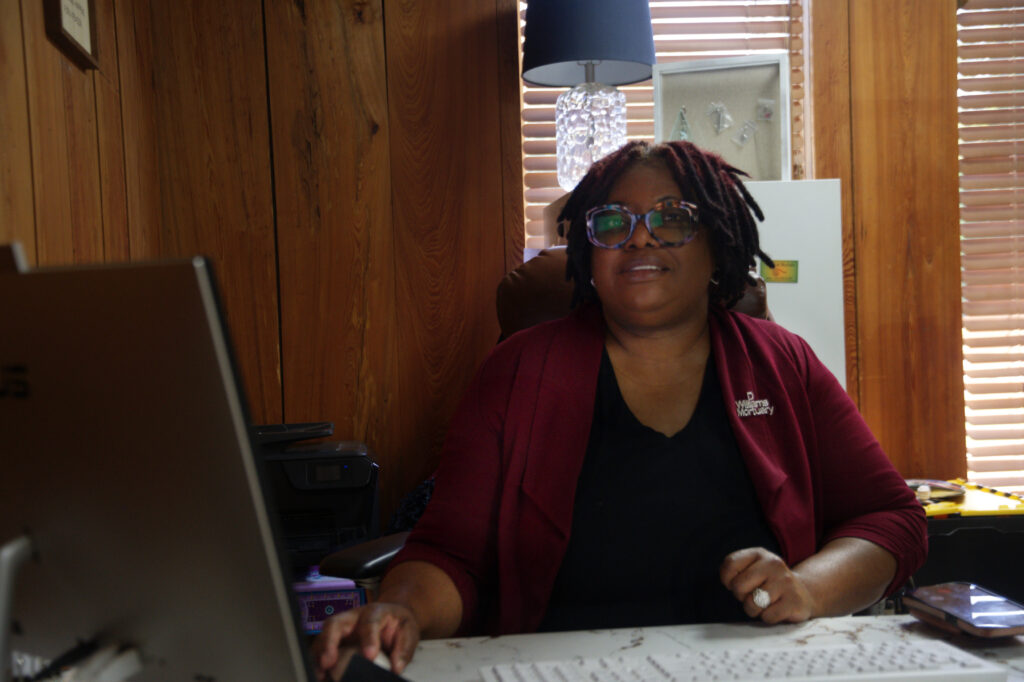
Daphina Williams smiles as she sits behind her desk on April 14, 2024.
August 9, 2024 | story and photos by Bonny Matejowsky
On Fridays, D. Williams Mortuary Services is a meeting ground for mourners.
Though the air is melancholy, this Friday is a beautiful sunny afternoon at the funeral home. Cars slowly pull into the dirt path just off 13th Street, its neatly gardened exterior a waiting area for friends and family to congregate and share memories. Some are crying. Others share laughter. They take turns walking inside, spending their last private moments with a loved one.
The crowd of about a dozen people is not here for a funeral. At least, not yet.
Fridays are typically wake days. And usually, they’re the most hectic. But you wouldn’t know it from the serene funeral director standing confidently by the doorway.
She’s dressed elegantly in a black bell-sleeved top and dress pants. Her pearl earrings glint in the sunlight as she speaks calmly with people outside, offering a well-manicured hand to those who need it.
For 53-year-old Daphina Williams, a licensed funeral director, embalmer and the owner of D. Williams Mortuary Services, this heavy task is just one of the duties that comes with the job.
The home is a modest building, formerly a solar panel dealership, with five rooms and two storage sheds. Inside, the interior looks more like a living room display at IKEA than a building for housing the dead. The white and silver-accented space is clean, with blankets folded on the sunken gray couch and flyers neatly stacked on the table in the corner. The sunlight hits the windows as it slowly sets. If you close your eyes, you can hear the woosh of cars speeding toward Paynes Prairie.
The light space brings peace to family members enduring some of the darkest days of their lives.
Daphina is not deterred by the grief that surrounds her. She can’t be — not when her day-to-day is a cycle of receiving remains, communing with loved ones and setting up funerals for each of the hundreds of recently deceased individuals rolled on a gurney into her back door.
It’s a demanding, dreary and often thankless job. Yet, she can’t see herself doing anything else.
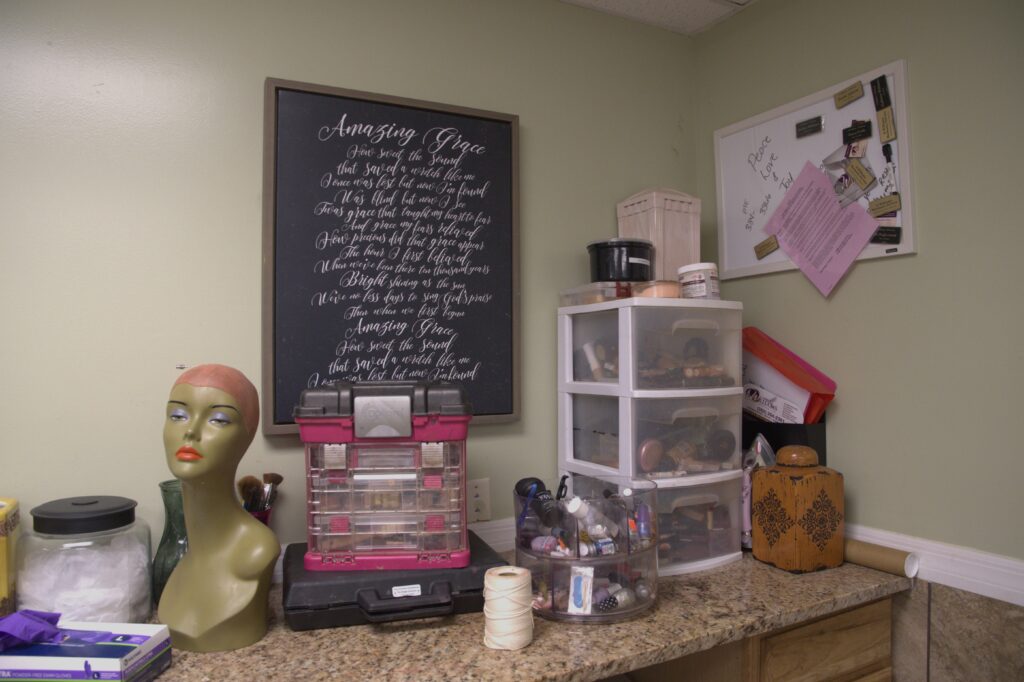
A counter in Daphina’s prep room stores a mix of regular and funeral-grade makeup supplies, April 14, 2024.
Finding Her Footing
Daphina’s fascination with death began to flourish in the small, springs-filled town of Williston, southwest of Gainesville in Levy County.
In ninth grade, she signed up for her school’s job-release program, which let students leave class early to work at a job of their choosing. This brought her to O.B. Samuel Funeral Home, where she was tasked with answering phone calls. The clerical work failed to quell her morbid curiosity.
“Every time [the funeral director] would leave, I would tiptoe to the back,” Daphina says. “I would go to the back and look under the sheets to see what was going on because I always wanted to know what happens after the person passes away.”
Even after her stint at the funeral home, her glimpses of the taboo never left the back of her mind.
She had her first son shortly after graduating high school, and for two years she received government assistance while living in a trailer next to her parents’ home. She found little satisfaction in the life of dependence.
She wanted more.
In a split-second decision, and much to her parents’ surprise, she decided to pursue her passion at Gupton-Jones College of Funeral Service in Georgia.
“‘I don’t care what they say or what they got going on. I’m going to mortuary school,’” she says she thought at the time. “I was determined.”
She graduated two years later, then bounced around chain and family funeral homes until 2018, when she established her independent funeral service, D. Williams Mortuary Services LLC.
Today, she operates her funeral home along with D. Williams Multipurpose Center, a venue offering game nights, food giveaways, free private tutoring, resume workshops and other services.
Death is typically a family business. According to the National Funeral Directors Association, nearly 90% of funeral homes in the U.S. are owned by families or individuals.
While Daphina had to build D. Williams Mortuary Services rather than inherit it, she soon saw the value in making it a family business. She works side by side with her husband, Alphonso Williams.
The pair sit on opposite sides of her office, exchanging smiles and knowing glances while recollecting memories from their 29-year relationship.
“He balances me,” Daphina explained. “There’s no miscommunication in our relationship.”
Alphonso takes care of the cemetery side of things. He digs the plots, drops the vaults and sets up tents and chairs for funerals.
“I help out wherever I can,” he says.
A few moments of silence follow.
“He’s a man of few words,” Daphina adds.
Alphonso nods in agreement.
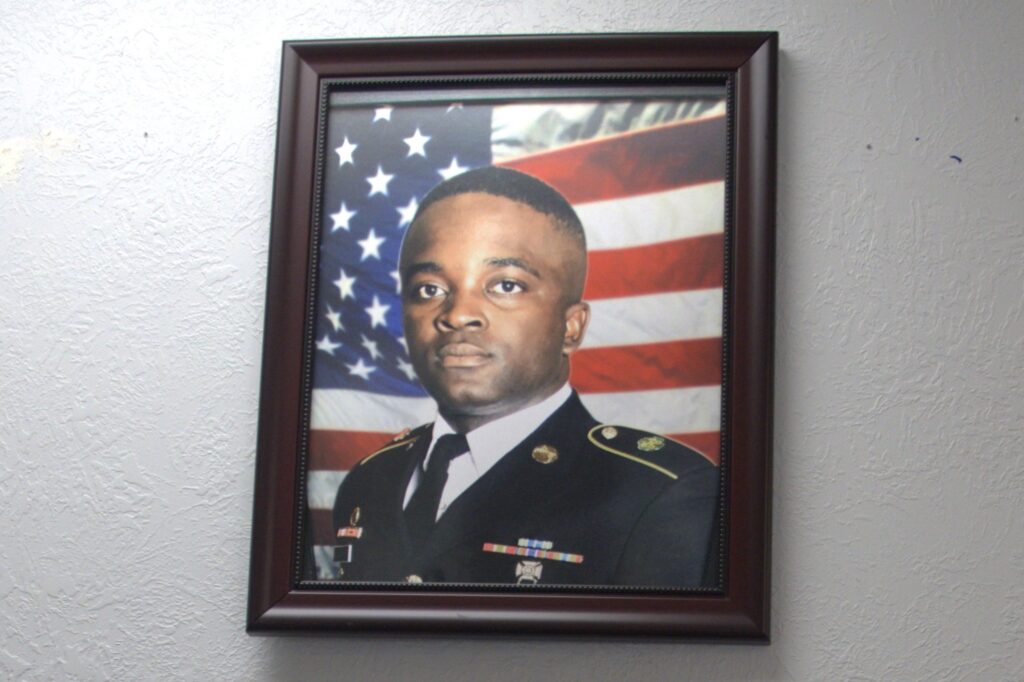
Daphina keeps a portrait up honoring her nephew Clarence Williams, who passed away in 2012 while serving in Afghanistan.
A Day in the Life
Daphina begins her day with paperwork.
Then, she opens a door marked “STAFF ONLY.” The tropical scent from the green candle in the waiting room is quickly overrun by the sharp chemical smell of formaldehyde. Sight and smell bear the unmistakable signs of the prep room.
As one of the largest rooms in the building, the prep room serves an assortment of purposes: Here, Daphina mixes chemicals, embalms bodies, applies funerary makeup and adorns the deceased in their final outfits.
Flowers and in memoriam signs for upcoming funerals are stacked neatly on the right side of the room. To the left, three bodies lie on cold metal tables, covered with thin plastic sheets.
“Those two on that table have been prepped and embalmed already,” she says casually, running her fingers along the embalming machine set on a marble countertop.
The machine is a stainless-steel box about the size of a microwave. When turned on, it pumps three gallons of embalming fluid through a long, black hose into a body’s arteries, slowing decomposition. Though the loud mechanical drill of the machine suggests otherwise, the process is minimally invasive and the most common post-death procedure Daphina performs.
Then, she uses a mix of funerary-grade and drugstore makeup to bring back life to an inanimate canvas. Using photos of the deceased reference, any sign of decay is expertly covered with a delicate hand. She fills spots of sunken skin with gel injections and covers up discolored skin with full-coverage foundations and powders.
Though relatives typically provide an outfit for their loved ones, sometimes they give Daphina a budget to pick out the clothing herself. Applying her eye for design, she communicates with the families to find the right colors and personal details to include in both their outfit and the funeral.
Even after these preparations are finished, her work is not. There’s still a wake to set up, a funeral to organize, a family to take care of — on top of the job’s emotional weight.
The tasks can be a lot to juggle at once. Daphina is grateful for the help she receives from her small staff of aspiring morticians.
Derrian Brown, a mortuary school student employed by Daphina, is glad to help in any way he can. Similarly fascinated with death, Derrian reached out to work with Daphina at 15 years old. Now, at 30, he looks to her as inspiration for his future in the industry.
“She tries to center each service around … what the deceased loved,” he explains. “One time, we had a guitar inside a coffin because the guy loved to play the guitar. Just adding those small details is very big to the family.”
Both agreed this field is not for everyone. There’s a certain type of personality and passion needed to withstand the daily reminders of grief and mortality.
“You have to be a people’s person,” Daphina says. She pauses and thinks for a second. “You have to somewhat be spiritually committed.”
At first, it was hard to leave behind the pain she witnessed every day. She can still vividly recall the first body she ever saw: a young man who died from a gunshot wound. The tragedy of the situation was palpable. The grief his family expressed was unforgettable.
“I can see his mom’s face as clear as day coming up to the funeral home,” she says.
Her memories drive her to help others but also weigh heavy on her heart. It’s not an easy burden to carry, but who else is going to do it?
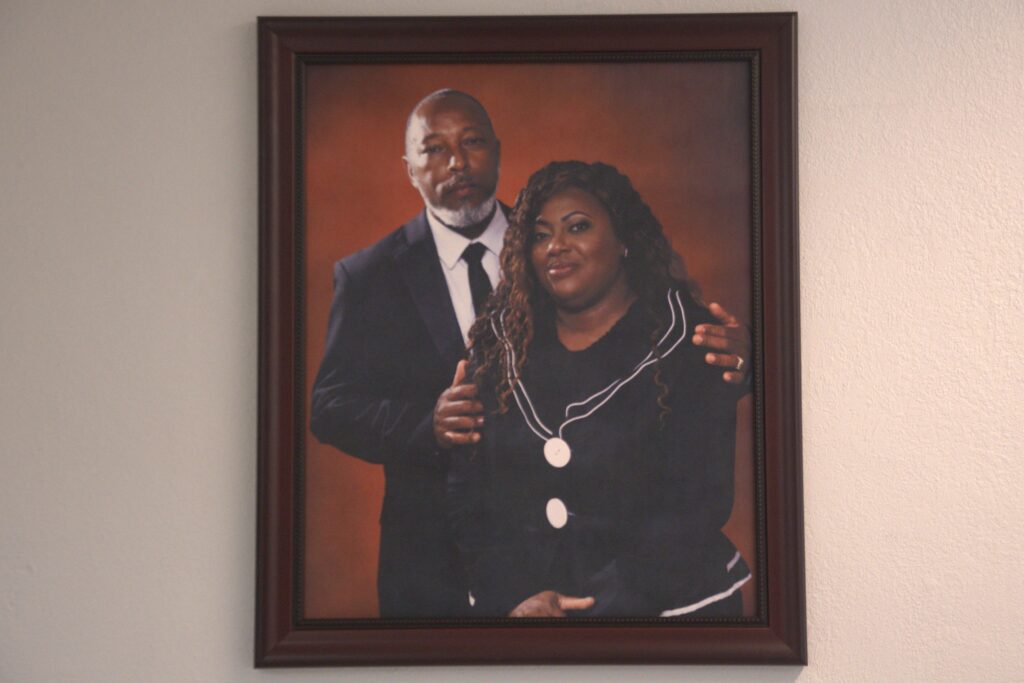
A portrait of Daphina and her husband, Alphonso, hangs in the living room in the funeral home.
A Bittersweet Memory
On one wall in the living room sits a large portrait of Daphina and Alphonso. Both adorned in black formal wear, he stands behind her with his arms on her shoulders. There’s a sense of comfort in her small smile and his firm stoicism, their photographic likenesses assuring clientele that they are in safe hands.
There’s another picture on the wall beside them: a young, uniformed soldier. Beneath it sits a pair of dusty tan boots in a glass display. They belonged to Army Specialist Clarence Williams III, Daphina’s nephew. He was killed in action while serving in Afghanistan in 2012.
The couple remembers Clarence as kind and devoted. He would make special trips to visit Daphina and spend time with her youngest son. During his final visit, the last thing Daphina asked him was if he felt worried about fighting for his country.
“He said, ‘No, I’m not afraid. As long as I have the Lord with me, I’m good,’” Daphina remembers, tears brimming in her eyes.
When the news of his death hit the family, there was no question who would handle his funeral services. Though a difficult task, his services were run by Daphina’s former firm in Chiefland.
“When we opened up this firm, we wanted his legacy to be remembered,” she says.
They created the Clarence Williams III Viewing Room, a sacred space where loved ones share their final goodbyes, in his honor. Clarence is a constant presence in the home, a bittersweet reminder of why she chose this path.
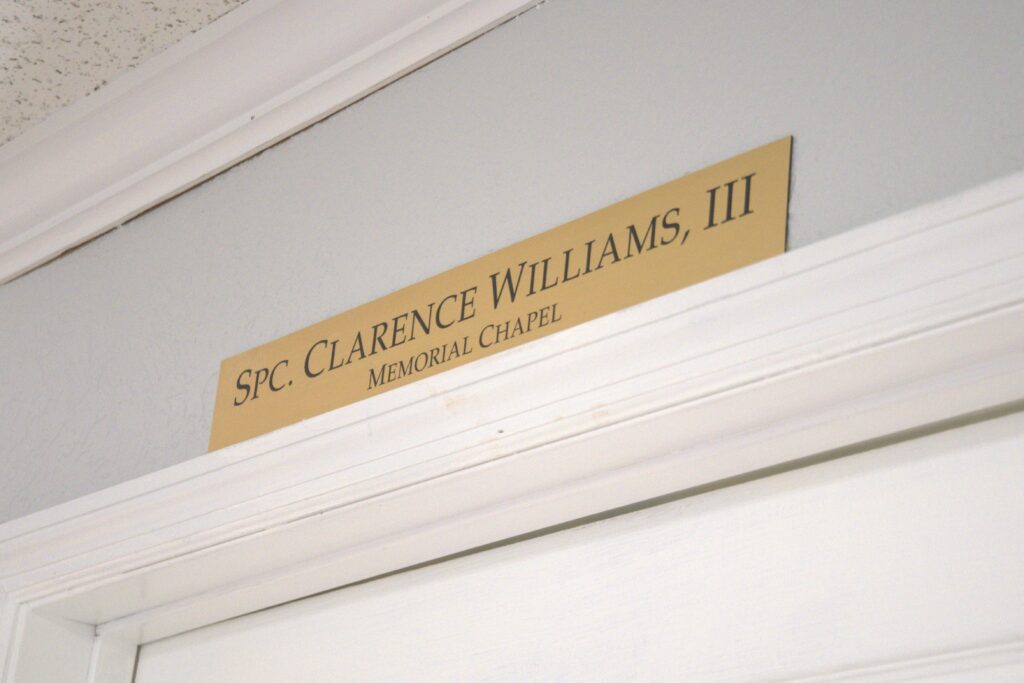
The Spc. Clarence Williams III Memorial Chapel, dedicated to Daphina’s late nephew, hosts wakes for the funeral home’s clients.
Finding Time for Family
This line of work isn’t your typical 9-to-5 job. It’s more like 24 hours a day, seven days a week. You can’t predict when your next body will arrive, let alone what condition it is in.
The phone number listed on Daphina’s website isn’t a landline — it’s her cell. When what she refers to as “death calls” ring during the wee hours of the night or in the middle of a family gathering, she is obliged to answer.
“If you’re in the industry, it seems like there’s no me time because the families — they depend on you,” Daphina says.
The pressure of helping other families alongside her own can make it hard to find time for herself. At 53 years old, she says she is just now figuring out how to find the balance between her personal life and her job.
“It’s not for the weak,” Daphina says. “Your whole soul has to be into what you are doing.”
With the demanding schedule of her job, she hasn’t had time for hobbies or vacations. She often dreams of retiring in 10 years and spending that time discovering a world she has yet to see.
“I always wanted to go to Paris,” she admits.
But for now, she will keep planning funerals and prepping bodies.
There’s nothing easy about death. But to lighten the burden, to provide some sense of comfort when someone’s world is falling apart, makes the long hours worth it.
“When I walk away from the service, the cemetery, the crematory, and I can hear the family say that the job has been done well,.” Daphina says, “that’s the best day for me.”